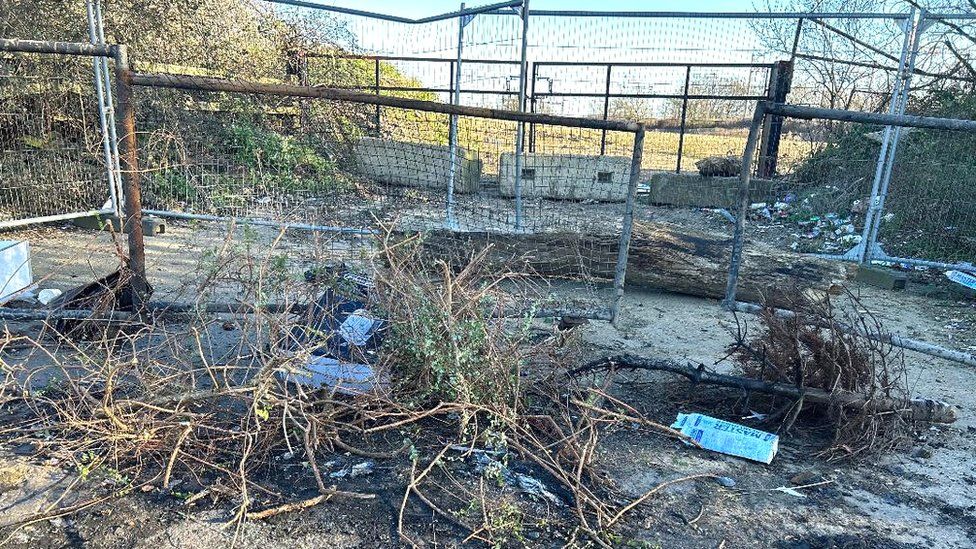ARTICLE AD BOX
 Image source, Colin Rayner
Image source, Colin Rayner
Farmers are using concrete blocks and security fencing to keep fly-tippers off fields
By Malcolm Prior
BBC News rural affairs producer
Fly-tipping in England had to be cleaned up 1.08 million times by local councils in 2022-23, the latest government figures reveal.
Clearing the largest illegal tips cost £13.2m, but the number of court fines dropped by 17%, raising just £785,000.
The figures, released on Wednesday, do not put a value on all fly-tipping costs and only cover public land.
But private landowners say the scale of countryside fly-tipping is forcing them to turn farms into "medieval forts".
The Country Land and Business Association (CLA) said fly-tipping on private land and fields is "going unrecorded on a mass scale", and that concrete blocks and security fencing were being used to keep out waste criminals.
One farmer, Colin Rayner, who has 2,000 acres of arable land across east Berkshire and south Buckinghamshire, said he has waste dumped on his land almost every weekend.
Image source, Colin Rayner
Image caption,Colin Rayner says the annual clean-up costs are "unimaginable" and affecting business
"We have even had an incident where we were combining in a field, and a lorry drove into the field, opened its tailgate and tipped a load of rubbish out and drove off again. They are that brazen," he said.
Mr Rayner added that the total annual clean-up costs were "unimaginable - it affects the viability of the business".
He is now using five-tonne concrete blocks and security fencing to close entrances to fields and stop the larger tipper truck lorries dumping waste on his land. But, he said, loads were still being dropped in the entrance ways and thrown over the fences.
Image source, Colin Rayner
Image caption,Landowners like Mr Rayner face prosecution if they do not clear away the waste
Security guards were even employed when there was a fly-tipping peak during the pandemic.
"It shouldn't be this way, but any farm in this area is doing the same. At one time their fields wouldn't be gated - they are now starting to gate their fields," he added.
The Country Land and Business Association (CLA) said a recent survey estimated that two-thirds of farmers and landowners were affected by the fly-tipping of tonnes of household and commercial waste.
Often hazardous chemicals and asbestos are dumped - endangering farm workers, walkers, wildlife, livestock and the environment.
Victoria Vyvyan, president of the CLA, said: "These fly-tipping figures barely scratch the surface of a crime that's blighting rural communities, with incidents on private land going unrecorded on a mass scale."
'Farmers pay the price'
Under the Environmental Protection Act 1990, private landowners have to remove fly-tipped rubbish or face prosecution.
The CLA says farmers are paying on average £1,000 each time, but with costs rising to £100,000 in extreme cases
Ms Vyvyan added that without a change in the system, "farmers, not the criminals, will continue to pay the price".
The CLA is now calling for local councils to help clear fly-tipping on private land as well as public land, and for the government to better resource enforcement agencies, such as the Environment Agency.
The NFU, which represents British farmers, has also called for council enforcement officers to be given enhanced police-style powers to tackle fly-tipping.
David Exwood, the NFU's vice-president, said fly-tipping was "affecting farmers' efforts to produce food and care for the environment, but is also taking a huge toll emotionally and financially".
Wednesday's figures reveal fly-tipping incidents have dropped by 1% since the previous year, with 60% involving household waste.
There were 42,000 larger illegal tips - so big that waste criminals would have needed a tipper truck or larger.
The number of fixed penalty notices issued went down from 91,000 to 73,000, while the total number of court fines decreased by 17% to 1,491.
Darren Rodwell, environment spokesperson for the Local Government Association, said sentencing guidelines for fly-tipping needed to be reviewed by the government so that offenders could be given bigger fines for more serious offences.
The BBC has approached the Department for Environment Food and Rural Affairs for comment.

 1 year ago
54
1 year ago
54








 English (US) ·
English (US) ·